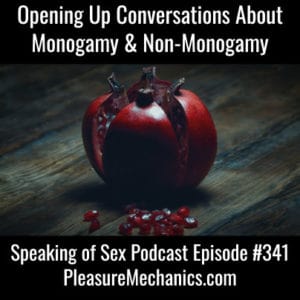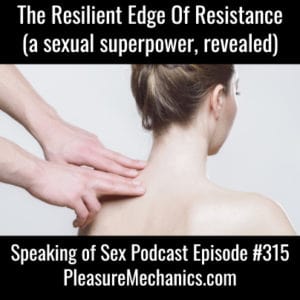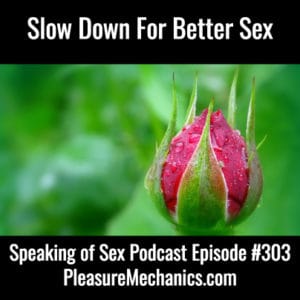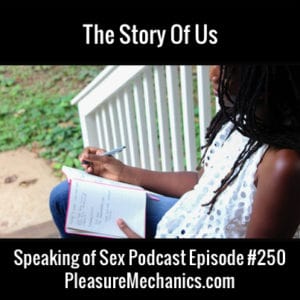Podcast: Play in new window | Download

What are you hungry for? What do you crave? What do you want so much you can taste it?
The fabulous Dawn Serra joins us for a conversation about recovering a joyful relationship to pleasure, desire and hunger. We explore what food and sexuality have in common as arenas of experiencing and realms of both struggle and liberation.
If you are ready for a deep dive into your relationship to pleasure, power and desire, join Dawn for her Power In Pleasure online course*, a 5 week experience enrolling now and starting July 21 2019! If you have been wanting to rewrite your scripts around pleasure and come into a more joyful relationship to your desires, join Dawn for this supportive group experience.
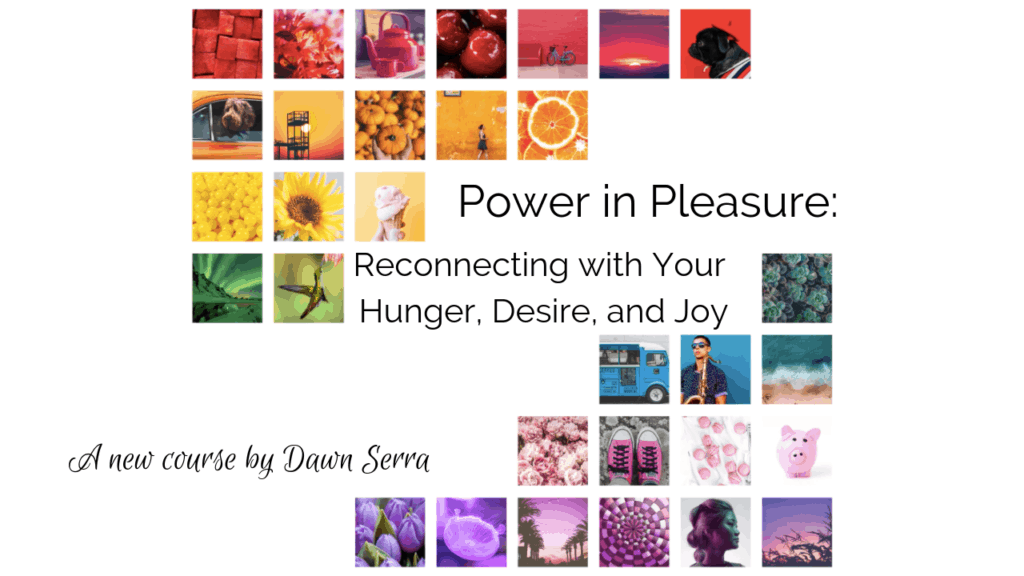
For more from Dawn, tune into our previous podcast episode:
Body Confidence with Dawn Serra
*When you enroll in this course we receive a small portion of the sale to support the podcast and our work. We have been through this course and highly recommend it!
Transcript of Podcast Episode What Are You Hungry For? Interview With Dawn Serra
Podcast transcripts are generated with love by humans, and thus may not be 100% accurate. Time stamps are included so you can cross reference or jump to any point in the podcast episode above. THANKS to the members of our Pleasure Pod for helping make transcripts and the rest of our free offerings happen! If you love what we offer, find ways to show your love and dive deeper with us here: SHOW SOME LOVE
Chris Rose: 00:00 Welcome to Speaking of Sex with the Pleasure Mechanics. This is Chris from pleasuremechanics.com, and on today’s episode, we are speaking with the fabulous Dawn Serra about hunger, pleasure, and desire. Dawn is one of my favorite thinkers in the field about sexuality and bodies, and at the end of our conversation she will invite you into a new course she is offering, a five week exploration of your relationship to pleasure and power and desire and hunger in your body. It’s a beautiful course. It is one I have gone through myself, and I highly recommend the experience if you are looking for an in depth exploration of pleasure and your relationship to it. Really, these questions of desire and worthiness, and what you allow for yourself is what this course will help you address in a safe, supportive community.
Chris Rose: 01:02 Without further ado, here is my conversation with Dawn Serra about hunger and pleasure. I will link in the show notes page to my previous conversations with Dawn and the collaborations we have done in the past. Of course, I will link to her new course which is enrolling now to start on July 21st. If you are listening to this now, consider this invitation and enroll using the link in the show notes page. If it is not the right moment for you or if you hear this in the future but are curious what Dawn is doing, that link will take you to her website and all of the events and offerings. She always has something going on. Here is my conversation with Dawn Serra. Remember, you can find all of our podcast archives at pleasuremechanics.com. Cheers.
Chris Rose: 01:51 Dawn Serra, welcome back to Speaking of Sex.
Dawn Serra: 01:55 Thank you so much for having me back.
Chris Rose: 01:57 Mm-hmm (affirmative). We will link to our previous conversations in the show notes, but for newcomers to the delightful Dawn, will you introduce yourself and a little bit about the work you do?
Dawn Serra: 02:09 I am a sex and relationship coach. I am about to finish my certification for being a body trust provider through Be Nourished. I have a podcast called Sex Gets Real. I run an annual online free summit Explore More. My spheres are really around pleasure, bodies, connection, healing, and how all of that ties to the erotic and sex, and even just the ways that we move through our lives and our relationships. I’m really diving deep lately into the connection between hunger and desire and the ways that we approach food and the ways we approach sex, and how often those things are deeply linked. It’s been a really, really, really extraordinary space for me this past year and a half, to be able to go really deep into this. It feels really yummy.
Chris Rose: 03:10 Mm-hmm (affirmative), and this is exactly where I want to focus, is this question of hunger. Pleasure and hunger, hunger and desire. What does it mean to be hungry for something? You’ve been doing so much beautiful thinking about these intersections. Will you just take us gently into these waters? How do you think about the word hunger right now?
Dawn Serra: 03:38 I think that it can have so many different meanings, but often when we think about hunger we tend to go straight towards food, which is practical of us. But, I also really like thinking about hunger as the things that we feel we need in order to be nourished. When I think abut the things that I need in order to feel nourished, the things that I want that would give me a sense of satisfaction or that would give me a sense of aliveness, those things extend far beyond but do include food. I think about touch. I think about connection and community. I think about play. I think about people that I love and tapping into my senses.
Dawn Serra: 04:37 When I really thinking about hunger from this place of the things that would nourish me and there’s this kind of wanting, this craving or this need behind it, it’s so much bigger than food, but definitely, definitely includes it. We tend to have a really complicated relationship with food because of diet culture. I think something else for me when I think about hunger is also that it’s complicated for a lot of us. That, hunger starts out fairly straightforward for us as tiny humans, but becomes very complicated for us as we grow into adulthood, especially in this particular iteration of culture. Yeah, I think it’s an important thing and a complicated thing.
Chris Rose: 05:24 I’m noticing that you went to hunger for what we need to be nourished, rather than fed or in order to survive. You one upped this notion of just feeding our bodies as a functional thing, and went to this idea of nourishment.
Dawn Serra: 05:42 Yeah.
Chris Rose: 05:42 What does the word nourishment mean to you?
Dawn Serra: 05:48 That’s a really great question. When I think about nourishment, I think about kind of a tiered experience. At its foundation, nourishment is what keeps me alive. It’s the things that feed my cells, that keep me breathing, that keep my body safe. And, I want to do more than survive. I want to thrive. I want to know joy. I want to know curiosity and play. For me, nourishment is what sets the stage for all of those things that bring me that deepest sense of aliveness. What nourishes my creativity? What nourishes my curiosity? What nourishes my play?
Dawn Serra: 06:47 When I think about nourishment, I think about not only the mechanics of keeping this body going, but also all of those less tangible things that keep me connected to my life, invested in my life, able to do the things that I like to do in this body as it is right now. It’s very sensitive to what is rather than the dream of what I wish was.
Dawn Serra: 07:21 I also think about nourishment as something that gets me to a place of satisfaction. You know, it’s not just, as you said, functional. I think that there is a cultural story that we should be treating our bodies as if they’re machines, but we’re human beings, we’re not machines. We are so much more than just input/output, and what you see is what you get. Right?
Dawn Serra: 07:53 When I think about nourishment I also think about some of those things like spirituality. How can I be spiritually nourished? How can I be ritually nourished? I think some of the things that go into that are love and acceptance and witnessing and healing. I think all of those, for me, are inside of nourishment.
Chris Rose: 08:19 Mm-hmm (affirmative). I’m curious, in your journey, as you’ve expanded your understanding of pleasure and nourishment and embraced and kind of practiced it in your life, has the importance of sex changed? Has it gotten deprioritized? Has it been complicated in some way? Like, is there a way we over focus on sexuality sometimes as a placeholder for a bigger conversation we haven’t had yet? Does that question make sense?
Dawn Serra: 08:56 Totally makes sense, and 100% yes. You know, that’s another thing that I want to tread on very lightly and with a lot of nuance. I think sex is so important for so many reasons. I think sex has the potential to be deeply nourishing, to expand our awareness of body and self, to deepen into pleasure that we didn’t know is possible. I think sex can help us do those things. And, I also think that there are so many pathways to embodiment, pleasure, connection, nourishment, feeling love, feeling connected beyond sex.
Dawn Serra: 09:45 I think that we often struggle to recognize those things because there’s such a hierarchy of pleasure that we have in this culture, and we’re taught that sex is the epitome of manhood, that sex is what makes you free, to be engaged in sex is to be someone who is sex positive, is to be someone who is evolved. All of these labels that we’ve kind of piled on top of sex, and I think sex is just one piece of this massive, massive puzzle of all the ways that we can get so many of our needs met.
Dawn Serra: 10:30 As I’ve started doing this work, it hasn’t shifted my love of having really delicious, yummy sex, but I think that it’s really shown me that, often, we are using sex culturally speaking but there’s also a very gendered element to it as well, that is a stand in for being able to say, “I feel lonely and I’d like to connect. I’m feeling stressed out and I could use a way to relax. I am feeling distant from you and I’d like to feel closer. I don’t have enough play in my life, I wish I could be silly.”
Dawn Serra: 11:10 I think so many of us put so much pressure and importance on sex, and when we start doing this work to really examine what are all the things that we’re hungry for, what are all of the things that could potentially bring us a sense of nourishment and connection and being seen, and in these imperfect versions of ourselves that we are, we start to see all of these other opportunities for getting needs met and also for being able to connect with people who are at a variety of places in their lives and in our lives. Our options become so much greater when we can kind of blow it out and stop focusing just on this one thing as a means to get so many of our other needs met.
Chris Rose: 12:02 Brilliant, beautiful, bam. Love it.
Dawn Serra: 12:05 Bam.
Chris Rose: 12:07 I’m curious, because you have been in this immersion around pleasure for many years. In the past year, I’ve noticed you’ve been bringing a lot of work around mindfulness and embodiment practices into what you’re sharing with your community. Can you speak a little bit about the practices of pleasure in your life and what space you’ve created for them, and then what those practices have brought you?
Dawn Serra: 12:37 Yeah. I think the first thing I want to start with is I am just like everyone else in that, prioritizing pleasure is fraught and it’s hard and it’s really easy to forget to do or to deprioritize in service of other things that feel more pressing. My practice is woefully inconsistent sometimes. Part of the work is being okay with that. I don’t want this to turn into another weapon with which I beat myself. I think so much of the work for me has been in yes, planning for big delicious luscious events that I can really just sink into for a longer period of time.
Dawn Serra: 13:31 But also, what are all of those micro points throughout the day and throughout the week where I can just really touch in for a couple of minutes, maybe a half an hour, and just really kind of feel into something yummy at the pace that fits that day. I think so much of what I’ve found is that, whether it’s a five minute slow walk outside or standing out on my balcony and just letting the sun be on my face for a few minutes and the wind in my hair or savoring a really delicious bite of food, even those small things are really important to just helping me to be present and helping me to kind of feel into this body that’s sometimes really hard to be in.
Dawn Serra: 14:22 That’s also given me a way to be a little bit more resourced. I’ve also really been thinking about the ways that I have deeply internalized the stories and the messages of capitalism. I’m trying to really start untangling that messy knot of my productivity does not determine my value, but it is hard to break up with that story. By having these small pleasure practices, I’m finding that disrupts that a little bit. That’s also a really helpful way to start kind of shifting some of those stories.
Dawn Serra: 15:03 Some of my pleasure practices include smells that I really enjoy. I love the smell of lavender and so I have some lavender bunches around my office. Sometimes I’ll just take a few minutes to smell that and just really be in the smell and the scent of the pleasure of that for a few moments. I get so much pleasure from play, and so at least once a day, sometimes more, I will cajole Alex into playing a game with me. Then we’ll do something really fun and ridiculous. Sometimes the game lasts five or 10 minutes, sometimes it lasts an hour. But, at least once a day there needs to be some type of game playing. I also have taken a lot of pleasure, I realized recently that one of the things that brings me tremendous pleasure is experimenting in the kitchen. I’m sure part of that is, prior to being in sex education, I was a food blogger and I was teaching cooking classes.
Chris Rose: 16:05 I didn’t know that.
Dawn Serra: 16:09 Yeah, I know, right? Hidden secret. Being in the kitchen for me is also deeply pleasurable. It’s not even necessarily about eating the thing, although that is also really pleasurable, but spending multiple days making sourdough bread or spending a couple of hours, like last night I made Mama Funko’s Cereal Milk Ice Cream. Just doing those things of being really present and watching things develop for me is a big pleasure practice. For a while, I had stopped doing that because I was just too busy or too tired. I realized several months ago that, even though it does exhaust me sometimes being in the kitchen for multiple hours, I feel really happy and nourished at the end. Like, it’s a good kind of tired. I’ve been prioritizing that a lot more. Our kitchen right now looks like a great big experiment because I’m just trying so many different things and that feels fun.
Dawn Serra: 17:09 For me, a bit part of the pleasure practice is finding the micro moments and honoring them, like, noticing them. Noticing that I slowed down to take a picture of that flower I really liked, and being a little bit mindful. Then, also some of the bigger things. Can we take an afternoon to go lounge at the park and read books? Or can we go hang out with our friends and have a great big dinner party full of really rich discussion. That, for me, is one of my greatest life’s pleasures. Or, we just got back from three weeks away, and while we did work while we were away a little bit, I was only working at like 15% capacity because I was trying to really center pleasure.
Chris Rose: 17:54 When people hear this, they may feel a stirring of hunger. Right? I think often in our podcasts when we paint pictures of what is possible, I’m sometimes aware of this kind of dual thing of painting the picture of what’s possible, and also knowing that there’s this kind of gap between feeling the hunger for these pleasures, feeling the hunger of three weeks of vacation, and then the steps of creating that as your reality. What is your process between recognizing hungers, kind of discernment between hungers that are fantasies and hungers that are things that you might actually give yourself permission to reach for? Then like, bumping up into those places of like, how dare you ask for that? How dare you ask for an afternoon off reading in that park? The ways we’re taught not to be hungry.
Dawn Serra: 18:59 Yeah. I think that’s part of the work, and that’s one of the reasons why I mentioned nuance earlier around this is, our lives are all so different. The ways that we move through them are very different. We experience different levels of access to resources and support and all of that is real and true. I want to be very careful to never prescribe to someone the way to do pleasure, the way to do hunger. I can’t possibly know what it’s like to be an indigenous trans queer person who is poor. I could never know that experience.
Dawn Serra: 19:52 I think one of the parts of this work is really taking an honest look at our lives and taking a look at, what are some of the things that maybe I can change, maybe I can influence but they feel scary, and what are some of the things that it’s just the way they are right now and I might not be able to change them but maybe I can do something different within them? I think those are important. Maybe I have to work three jobs right now to keep a roof over my head, and not working three jobs isn’t an option. Then that’s true. How, inside of that, can maybe I find small moments to be able to feel into some of the things that I’m hungry for?
Dawn Serra: 20:36 I think inside of that too is some grief work, and that’s one of the things I have really found is important. I talked to Afro Sexology earlier this year and they were talking about how the deeper they went into their pleasure the deeper they also went into pain. I think that that’s also a really important thing to just name, that the more we open to any feeling, the more we open to all feelings.
Chris Rose: 21:02 All of them.
Dawn Serra: 21:04 All of the feelings, yeah. So much of this work around pleasure is deep grief work.
Chris Rose: 21:10 Yeah.
Dawn Serra: 21:11 Deep grief work. You know, what all of the things that I never allowed myself because I didn’t feel worthy? That’s probably a lot, and there’s probably a lot of grief and anger inside of that. What are all the things that I told myself I would do one day when, because I didn’t feel worthy of doing it then? How many decades maybe passed? How many years? How many missed opportunities and missed connections? There’s grief in that, or maybe because of choices that I made in the past, I ended up here, and I wish I could have chosen differently. That’s grief work that we have to do around our hungers.
Dawn Serra: 21:51 And, I think some of where the work is too is really starting to kind of confront some of the things that we don’t allow ourselves because we don’t feel worthy of the wanting. That, I think, is such an interesting place. We all are existing inside of capitalism and neoliberalism and white supremacy and sex negativity. I mean, all those things are true, and there are still ways to connect, to touch in with our lives. Really, really small ways even inside of those things if we want to or if we have the ability to.
Dawn Serra: 22:31 Even when we start to realize, well, maybe I could ask for something different. Maybe this thing that hasn’t been working for me in a really long time in my relationship is something I could ask for to change, but then the fear comes up because we’re afraid of being left. We’re afraid of being alone and abandoned. We’re afraid of being judged and shamed, especially if that’s happened in the past. We’re afraid of so many things that then, we limit ourselves on top of the limitations that exist in the world. I think so much of the work around pleasure is recognizing the actual limitations, and then realizing the ways we limit ourselves.
Dawn Serra: 23:15 Sometimes those limitations we place on ourselves are deeply protective. Sometimes we do have to go with the flow in order to keep that roof over of our head, in order to not be kicked out of the group, and those things are all whys, but at least being able to notice them and to speak truth to them, then gives us an opportunity to decide if we want to stay, can we leave, can we change something. That’s what I want for people, is more choice and more opportunity to see where there are choices. That brings in that element of awareness.
Dawn Serra: 23:51 You know, you and I have talked about this in the past and I just love it. I’ve brought it into so many of the things that I have done, which is just, our hungers are always going to be bigger than our lives can hold in so many ways. Our desires are going to be bigger than our lives can hold in so many ways. Inside of that, then, some of the work around pleasure is really kind of saying, what do I need to grieve and how can I honor that this is true? How can I honor that I really, really, really for my whole life have wanted to move to Iceland? Or, I’ve really, really, really for my whole life wanted to write a book. Or, whatever it is. Maybe because of the circumstances of my lief right now, those things just can’t happen, or it’s very unlikely that they will.
Dawn Serra: 24:42 How can I say, yes, those things are good and true and real and I am deserving of them, and they’re just not possible right now and so I’m allowed to feel sad about that and I’m allowed to feel disappointed. But, the life that I’m leading right now, there’s other things that I want to be putting my time and energy to, and so I have to let those things just be things that don’t get to get fulfilled. There’s so many moving pieces in this, of the feeling into the grief and the anger, feeling into the fear, finding ways to celebrate what is, working within the conditions of our lives and maybe working to change some of them, maybe not.
Dawn Serra: 25:29 Something that someone that I was working with a few months ago kind of realized was she was deeply unhappy with the sex that she was having in her marriage. She was feeling very pressured and dissatisfied. The stories she had been telling herself was, if I can just fix my low libido then everything else will be okay. She kind of got to a place of realizing, “I’m not broken. There’s nothing wrong with me.” But, what that then means is, the problem is with the relationship and that was too much for her. That was just not something she was able to face at that point in her life.
Dawn Serra: 26:15 She decided, “Okay, I’m just going to let this stay the way that it is and keep trying to work on myself a little bit more, because it’s too painful to think that maybe it’s this relationship and the way that we’re doing it.” That’s okay too. We get to take care of ourselves and do the things that we feel are most important that that juncture in our lives. I don’t have any judgment around that, but I think it’s the awareness that I want people to come into of just like, “Oh, maybe it’s not me. But, you know what? I can’t change this right now. I’ve got young kids. I can’t pay the mortgage on my own. This is just how it’s going to be and that might be uncomfortable, but now at least I can feel into, what are my options now that I’ve got this awareness.”
Chris Rose: 26:59 Right. Still making a choice, right, still having that agency around it.
Dawn Serra: 27:05 Right, right.
Chris Rose: 27:06 What are some of the things you’ve learned about food and eating and the body that have influenced how you think about sex, and some of the things you’ve learned about sex that influence how you talk about food? What are some of the surprising overlaps?
Dawn Serra: 27:23 You know, I think what’s kind of funny about it is, the more I reveal, the less surprised I am.
Chris Rose: 27:35 Yeah.
Dawn Serra: 27:35 It was kind of like that very first time that I finally made the connection I was like, “Holy crap.” The way we do food is the way that we do bodies and the way that we do sex, I mean, they’re all tied together and they’re all so adjacent. When we’re restricting the things that we enjoy around food, we’re often restricting the ways that we allow ourselves to access pleasure to be in our bodies. When we feel guilty about eating certain things, we often also feel guilty about fantasizing or wanting certain things. There’s just like, so much. The deeper I’ve gone into that, the less surprising and the more just kind of like, “Of course,” it’s become. Why didn’t I see this before? It just makes so much sense.
Dawn Serra: 28:23 I think one of the things that’s really hard for people, and I think maybe this is where not so much surprises come in, but kind of where some of the like, yeah, we really got to chew on this for a while, is often, people are ready to really start confronting their relationship with diet culture and fat phobia, and then they’re totally not ready to do the sex stuff. I find vice versa is often true. I find that there are so many people who will say, “I really want to change the way that I do sex. I want to feel more confident in my body. I want to be more present.” Then, as soon as we start talking about, what’s your relationship with food, with diets, all the things that go with that, there’s just this, “Whoa now, we’re supposed to be talking about sex.”
Dawn Serra: 29:23 There’s kind of this resistance of I just want to fix the sex part or, I just want to do food differently, not realizing that doing food differently then means you’re going to do everything differently in your life, and how deeply, deeply, deeply intertwined they are. Because, ultimately all of it: food, pleasure, sex, relationship, all of it comes down to, how much are we trusting our bodies? Can I really hear the things that my body is telling me? Is there a two way dialog happening? Can I communicate with my body and can I hear what my body is telling me, asking for? How am I with my boundaries? Pretty much everything when it comes to food and movement and sex has to do with boundaries. Am I able to really say here is what I want, here is what I don’t want, and to be able to tend to those boundaries, even if the people around me have really intense feelings about it?
Dawn Serra: 30:29 What’s interesting is what’s under the covers around food and around sex and the erotic, is body trust and boundaries. When we really start examining the ways that we interact with our body or we cut ourselves off from our body, and when we examine the ways that we do boundaries, especially with people that are really close to us in our lives like our family and our partners, we start finding all kinds of rubble and juicy, uncomfortable bits that start really revealing some of our patterns around the ways that we deny our hungers, twists our desires, distrust the signals of our bodies or we can’t speak up on behalf of them. Underneath it all, it’s all kind of standing on the same foundation. It’s just then, we’ve built on top of it kind of into these different silos and we don’t realize they’re all connected underneath.
Chris Rose: 31:35 Yeah, yeah. That, all of us are kind of standing together then in this culture that is breeding that distrust and teaching us that disconnection, and that interrupting it is a real process. I think that’s what surprises people again and again for in my email box, is like, how much work and process it is to start trusting the body, to start living into the body, sensing and the feelings, because it is counter-cultural.
Dawn Serra: 32:08 Yeah.
Chris Rose: 32:10 Can you talk a little bit about your upcoming offering? It’s starting soon. Talk to us about Power and Pleasure, please.
Dawn Serra: 32:20 Yes. I am completely in love with this experience, so if anyone’s listening and they’re getting that little, “Ooh, maybe I should check that out,” totally check it out because it’s awesome. I have a five week online course called Power and Pleasure. The course is really about us realizing that our power and our access to power is deeply tied to our pleasure. So much of the work that unfolds over the course is really about, what are these very small ways that we can just arrive with the body, with our hungers, our desires, how can we feel into our senses and just allow that to be a really gentle in road to the body? It’s this exploration of not only sex, certainly food, but all of the other things that we’re hungry for and our complicated relationships with our desire.
Dawn Serra: 33:32 Throughout the entire course, there’s this beautiful support that happens where people are witnessing each other’s really complicated stories, celebrating things that they do. We have group calls every week. They’re so intimate and so vulnerable, where we can really, really be in the ugly, complicated, messy, uncertain spaces and to not have to be there alone, and to find all of these ways by the end of the course to have lots of new questions to carry out into our lives, so that as the months unfold beyond the course, we start noticing all of these opportunities for pleasure, for honoring our hunger, for listening to our body, because we’ve started writing our way into some new stories over the course of the course.
Chris Rose: 34:30 The course starts July 22nd. Do you have to be in by July 22nd? How do you [crosstalk 00:34:36]
Dawn Serra: 34:36 You do have to be in by, actually I close it on July 21st because we have a pre-course call on that Sunday, and it’s all about safety. I think that’s something else that’s super important, and I will probably build it out in the years to come. But, something that I think gets missed in almost all of the conversations that I see specifically around sex and the erotic, is that safety has to come first. Safety has to come first. Our bodies literally can’t code things that might be pleasurable as pleasurable if we feel unsafe. It’s just not biologically possible. We’re wired for survival. Pleasure is nice to have once we’re sure we’re going to survive.
Dawn Serra: 35:23 We start the course with a pre-module, people get it a few days ahead of time or if they sign up on the very last day, which lots of people always do, then they get it that day and can work through it on their own time. But, we start with safety. July 21st is the cutoff. We have that pre-call where we talk about safety. Then it all kicks off on July 22nd. The thing that I really want people to walk away with is, this is not on us to do completely on our own. I don’t want to create something that contributes to this sense of, “I have to figure it out and pull myself up by my bootstraps and fix all the things myself.” That’s not how we heal.
Dawn Serra: 36:04 I want us to feel like we’re in this together, and that your pleasure is tied to my pleasure, is tied to everyone who’s listening’s pleasure. Let’s be in it together, a space to ask some new questions and practice some new things without having to feel like you’re doing it alone, to be able to say really, really scary things that maybe you can’t say other places, so that there’s just a little bit more space on the other side to feel into, “Oh, okay, maybe I am deserving. Maybe I am worthy. Maybe I can try these things, even if they feel scary.” Then, allow that to be something you curiously follow beyond the course.
Chris Rose: 36:48 Thank you for holding the space. This is an invitation for July 2019. If you’re listening to this down the road, hello future selves, use the links in the show notes page and you’ll come to all of Dawn’s beautiful work and offerings. There is always something going on at dawnserra.com.
Dawn Serra: 37:11 That’s very true.
Chris Rose: 37:13 The pleasure host with the most. We love you Dawn. It’s a pleasure to be in this field with you. Thank you for joining us once again on Speaking of Sex.
Dawn Serra: 37:21 Thank you so much for having me.
Chris Rose: 37:23 Thank you so much for listening. If you feel like this pleasure course is a good fit for you right now, I encourage you to use the link in the show notes page to explore Dawn’s course offering. It’s a super affordable course for the level of personal attention and group support you get on this five week journey of exploring your relationship to pleasure and your body. If this is a question that has been itching for you, I would definitely encourage you to check it out. As I said, I will be in that course with you exploring together and learning with you.
Chris Rose: 38:02 We will be back with you next week with another episode of Speaking of Sex with the Pleasure Mechanics. Meanwhile, find all of our archives and our online courses at pleasuremechanics.com. I am Chris from pleasuremechanics.com, wishing you a lifetime of pleasure. Cheers.
